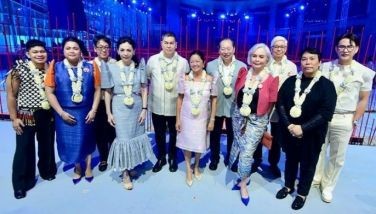Car exec warns of rise in CBU imports if value-based excise tax is implemented
April 28, 2003 | 12:00am
Imposition of a value-based excise tax system will only drive local automotive manufacturers to resort to importation of completely build-up (CBU) units instead of manufacturing vehicles locally.
This possibility emerged during a recent tripartite discussion among the academe, government and automotive manufacturers on the proposed excise tax shift.
Isuzu Philippines executives led by its president Toru Koyasu said that for manufacturers like Isuzu, which has a tie-up with American car manufacturer GM, it would be easier to import CBUs under a value-based excise tax rather than invest in local manufacturing operations.
Koyasu cited the fact that establishing local manufacturing operations takes two to three years of preparation as substantial investments have to be made in jigs and equipment, localize parts and train manpower.
A two-to three-year preparation, Koyasu said, is acceptable if policy changes are done over a period of time and not immediately as planned with the shift from engine-based excise tax to value-based.
If local manufacturers resort to imports, Koyasu said that there could be some lay-off of workers.
Importing CBUs is perceived to be a way of getting around the value-based excise tax since the importers could declare a lower price for the vehicle as a result of more efficient manufacturing operations outside of the Philippines.
Local automotive manufacturers in the past have cited several factors contributing to the higher cost of locally manufactured vehicles, these include the tariffs and duties on semi-knocked down (SKD) kits, foreign exchange cost, the substantial investment in local assembly facilities, and increasing labor costs.
University of the Philippines School of Labor and Industrial Relations Dean Rene Ofreneo, agreed that a value-based excise tax would indeed favor more importation and result in less local assembly.
Government, Ofreneo said, should regard its taxation policy as an industrialization policy tool rather than just a revenue tool.
In other countries, Ofreneo pointed out, they try to reduce imports to protect their industries by reducing taxes of locally produced items.
Under the existing engine-based excise tax system, for instance, government was able to encourage the manufacture of the Asian utility vehicles (AUVs) which has become the most versatile mode of private and public transport and which has kept the local automotive industry afloat.
Unfortunately, if the current excise tax system is modified to a value-based system, the incentive for AUVs would be removed and would tend to favor lower-priced imports.
This possibility emerged during a recent tripartite discussion among the academe, government and automotive manufacturers on the proposed excise tax shift.
Isuzu Philippines executives led by its president Toru Koyasu said that for manufacturers like Isuzu, which has a tie-up with American car manufacturer GM, it would be easier to import CBUs under a value-based excise tax rather than invest in local manufacturing operations.
Koyasu cited the fact that establishing local manufacturing operations takes two to three years of preparation as substantial investments have to be made in jigs and equipment, localize parts and train manpower.
A two-to three-year preparation, Koyasu said, is acceptable if policy changes are done over a period of time and not immediately as planned with the shift from engine-based excise tax to value-based.
If local manufacturers resort to imports, Koyasu said that there could be some lay-off of workers.
Importing CBUs is perceived to be a way of getting around the value-based excise tax since the importers could declare a lower price for the vehicle as a result of more efficient manufacturing operations outside of the Philippines.
Local automotive manufacturers in the past have cited several factors contributing to the higher cost of locally manufactured vehicles, these include the tariffs and duties on semi-knocked down (SKD) kits, foreign exchange cost, the substantial investment in local assembly facilities, and increasing labor costs.
University of the Philippines School of Labor and Industrial Relations Dean Rene Ofreneo, agreed that a value-based excise tax would indeed favor more importation and result in less local assembly.
Government, Ofreneo said, should regard its taxation policy as an industrialization policy tool rather than just a revenue tool.
In other countries, Ofreneo pointed out, they try to reduce imports to protect their industries by reducing taxes of locally produced items.
Under the existing engine-based excise tax system, for instance, government was able to encourage the manufacture of the Asian utility vehicles (AUVs) which has become the most versatile mode of private and public transport and which has kept the local automotive industry afloat.
Unfortunately, if the current excise tax system is modified to a value-based system, the incentive for AUVs would be removed and would tend to favor lower-priced imports.
BrandSpace Articles
<
>
- Latest
- Trending
Trending
Latest
Trending
Latest
Recommended
June 15, 2024 - 12:00am





























